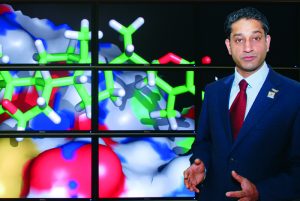
By UConn Foundation
Royce Mohan wants to help people see life more clearly. From a figurative standpoint, he could have been a philosopher. But he took his ambition more literally, becoming a vision scientist who specializes in treating injured eyes.
Still, Mohan, the new John A. and Florence Mattern Solomon Chair in Vision Biology and Eyes Diseases at the UConn Health Center, hasn’t left philosophy behind in explaining his choice of a career. “It’s the first thing you do when you wake – open your eyes,” he says. “It’s the most important sensory organ. It’s how we perceive the world.”
As he fingers a model of a chemical compound on his desk – a snap-together toy that teachers, some scientists, and almost all adolescent scientists keep at the ready – he talks about his winding road to vision biology, one that involved extensive training in chemistry, a Ph.D. in plant molecular biology, and some time as co-director of the University of Kentucky Natural Products Alliance. Mohan is an ardent believer in the power of natural products, and has carefully studied medicinal plants used for centuries to treat human ailments.
“The human body is obviously very special in many ways,” he says. “In some ways, I see myself as an engineer learning to use tiny chemical tools with precision to solve a complex biological challenge. The discovery timeline is exciting, because we are speeding up the selection process by a few million years to pair such chemical compounds with their human target proteins by borrowing technology from nature.”
John A. and Florence Solomon, who funded the chair, lived in the suburban town of Canton, Conn. for many years. John Solomon, the longtime president and chairman of Security-Connecticut Life Insurance Co. of Avon, Conn. and a director of the UConn Foundation, died in 2008. Florence Solomon now lives in Arizona. The Solomons initially created the Florence Mattern Solomon Fund for Eye Disease in 1979. The fund was converted in 1985 to support UConn’s first endowed chair, soon after Mrs. Solomon began to lose her sight.
“I had some vision problems back then,” Mrs. Solomon says. “And that’s why my husband did it.”
Years later, Florence Solomon began to suffer from macular degeneration, one of the areas on which Mohan’s research focuses. For him, the connection is serendipitous. “The chair was particularly well-suited to me,” he says.
His curiosity unabated after years of study, Mohan talks about the eye’s distinct immune system. “If you injure the cornea, which is the transparent tissue covering the iris pigments, it often heals itself without a scar,” he marvels. “Ophthalmology surgeons also sculpt this tissue to alter its shape and correct vision defects. How does this perfect healing take place?”
Not all injuries or surgical procedures heal well, however, and that, Mohan says, is the heart of the study of scar tissue, or fibrosis: “It’s like cutting diamonds, then finding the one that is defective and trying to find out what went wrong.”
With a childhood in India and training at some of the world’s most scientifically vigorous institutions, including the Indian Institute of Technology at Kanpur, Harvard, Tufts, and Yale, Mohan’s approach to research and discovery is unabashedly energetic. That energy came to fruition when he was working as an associate professor in the Department of Ophthalmology and Visual Sciences at the University of Kentucky, winning acclaim for a discovery that holds the potential for new treatments for diseases of the brain, spinal cord, and eye.
Mentored at Yale in chemical genetics, and inspired by a pioneer in angiogenesis, the late Judah Folkman of Harvard, Mohan brings a distinctive mark to anti-angiogenesis and anti-fibrosis therapeutic research. Angiogenesis is the physiological process involving the growth of new blood vessels from pre-existing vessels.
Not surprisingly, he has a big vision for the Solomon chair. He is creating the Laboratory for Chemical Biology and Drug Discovery at UConn, to attract scientists of varied backgrounds to help in the process of drug discovery for eye diseases.
It has been a long road that has culminated, for now, in the nascent field of chemical biology. “I probably had to train longer and give up lucrative career options along the way,” Mohan says, turning the molecule model around and about like a revolving planet in his palms, symbolic of the rotations and revolutions of his career. “Now I look forward to solving some of the most insidious problems of visually impaired people. We should focus on a treatment for scarring, because with no therapeutics available to millions of people blinded by scarring, it is clearly time to awake to this thought.”
To give to the UConn Health Center, please contact the Foundation’s development department.